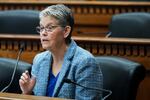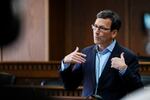With the bang of a gavel just after midday Monday, the 105-day legislative session began for Washington’s lawmakers in Olympia.
This year, senators and representatives will work with the state’s first new governor in 12 years as they consider ways to close a massive budget gap, and weigh policies on almost everything you can think of, from rent hikes to kimchi.

Speaker of the House Laurie Jinkins, D-Tacoma, speaks during a legislative session preview at the Capitol Thursday, Jan. 9, 2025, in Olympia, Wash.
Lindsey Wasson / AP
During her opening day remarks, House Speaker Laurie Jinkins (D-Tacoma) struck an optimistic but somewhat defiant tone, noting that the state’s budget crisis – and the incoming Trump administration – are among the top challenges that will influence lawmakers’ work this year.
“Protecting Washington’s way of life is important,” Jinkins said. “And we’re going to stand up for trans people, for immigrants, and for all Washingtonians who find themselves under attack by those who choose to divide us rather than unite us.”
As the session gets underway, here are three key things to watch:
1. Money, money, money
State officials have been talking for months about the looming gap between promised future spending and the money they will actually have to pay for it all. Estimates vary, but the shortfall is expected to be upwards of $10 billion over the next four years – and it could be several billion larger than that, depending on how much new spending elected leaders pursue.
Democrats in the Legislature are already talking about ways to find more revenue to cover the gap, mainly through taxes on the state’s wealthiest residents. Some are more enthusiastic than others about the possibility of creating a wealth tax, but leaders are trying to keep all options on the table. Republicans, meanwhile, are certain that the state could reduce its spending enough to close the budget hole by looking for more efficient ways to spend state money, and by rolling back key cost drivers in certain policy areas.
One thing almost lawmakers across the aisle are in agreement about: at least some cuts and spending delays are inevitable. But they’ll have to negotiate the size of those cuts and delays, and in what areas of the budget those reductions will come from.
2. Ferguson has arrived
He’s actually been in Olympia for years already as attorney general, but Democrat Bob Ferguson is entering his governorship era with an ambitious agenda to cut spending and fulfill promises he made on the campaign trail.

Governor-elect Bob Ferguson speaks during a legislative session preview at the Capitol Thursday, Jan. 9, 2025, in Olympia, Wash.
Lindsey Wasson / AP
Ferguson is already striking a different tone than his outgoing predecessor, Jay Inslee, when it comes to budget issues. In his recently unveiled budget priorities, Ferguson said he is “skeptical” on whether a wealth tax would work – and he made clear his budget plans are rooted in a cuts-first strategy.
Still, Ferguson has also said he wants to spend some new money, including $100 million on grants for local law enforcement agencies to hire more officers, and money to ensure all kids in K-12 schools can eat breakfast and lunch for free.
Ferguson’s take on the budget so far is somewhere in the middle of what both Republicans and Democrats have said they want to accomplish this session, with some Republicans particularly optimistic about Ferguson’s emphasis on taxes “as a last resort.”
To that end, some lawmakers are eager to work with the new governor and expect he’ll be more involved in the workings of the Legislature. Ferguson himself says he hopes to be an “active presence” around Olympia as the session unfolds.
3. Rent, roads, and other big priorities
The rent stabilization bill of last year has made its return. The bill, which would cap the annual amount that a landlord can raise their tenants’ rent each year, met its demise in 2024 after passing through the House only to meet a Democratically reinforced wall of opposition in the Senate.
But some Democrats have changed their tune, and combined with election-induced turnover in the Legislature, supporters of the proposal have renewed optimism about its prospects this year. The bill gets its first hearing on Monday afternoon in the House housing committee.
Transportation leaders are also eager to put the state on the road away from the gas tax and toward a pay-per-mile road usage charge instead, as revenues from the gas tax decline with the rise of more fuel-efficient or electric-powered vehicles. The Democrats who lead the transportation committees say they’re ready to begin phasing in the concept of a pay-per-mile road tax. Their Republican counterparts, meanwhile, aren’t as eager to make that change.
In terms of their overall wish lists this year – other than fixing the budget – top lawmakers have said their priorities this session include K-12 schools, public safety, and ways to lower costs on things like child care, food, health care, and housing.
Jeanie Lindsay is a radio reporter based in Olympia who covers the Washington state government beat for KUOW and KNKX. This story comes to you from the Northwest News Network, a collaboration between public media organizations in Oregon and Washington.
It is part of OPB’s broader effort to ensure that everyone in our region has access to quality journalism that informs, entertains and enriches their lives. To learn more, visit our journalism partnerships page.